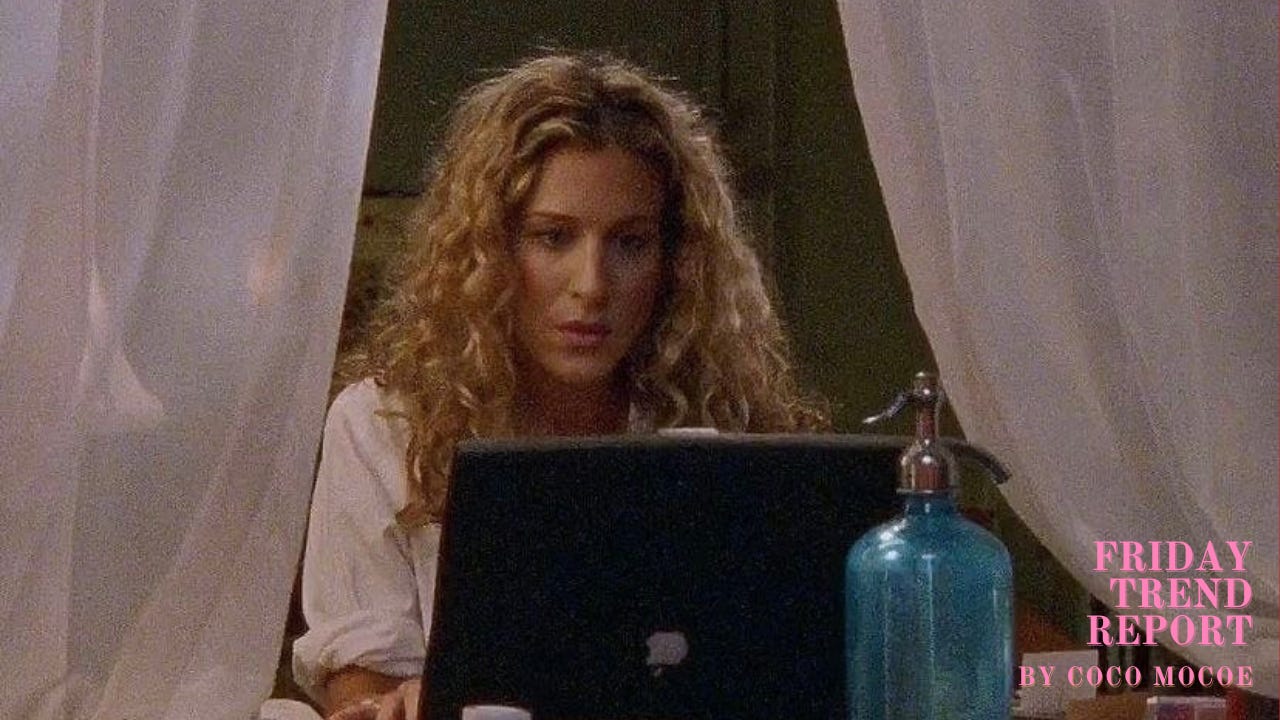"Main Character Syndrome" is Making Gen-Z the Loneliest Generation
Gen-Z desperately wants to be Carrie Bradshaw but they lack community. What can we learn from this phenomenon and what comes next as the pendulum swings?
In this FTR (Friday Trend Report), we will explore:
What is “main character syndrome" and why has Gen-Z embraced it so strongly?
What was the catalyst for Gen-Z’s insatiable desire to be seen and heard?
What parallels can we see between Carrie Bradshaw from Sex and the City and Gen-Z’s “main character syndrome”?
In the full article, available to paying members of this best-selling Substack, we will exlpore:
The Carrie Bradshaw Complex: Content 📱 vs. Content 🧘
What is the one thing Carrie Bradshaw had that Gen-Z lacks?
What can we learn from the younger generation (Gen Alpha) in building community online? Something they seem to be uniquely good at.
The Carrie Bradshaw-ification of Gen-Z:
If you are a woman between the ages of 20-40, you probably had a phase where you watched “Sex and the City” at one point or another. It is a show that has withstood the test of time. And with licensing on Netflix, and it’s home of HBO MAX, Gen-Z has fallen in love with a show ahead of it’s time.
While the show aired decades before most Gen Z were old enough to watch HBO, Carrie's character has found new life on TikTok, Instagram, and (especially) Substack. To Gen Z, Carrie isn’t just a columnist in a rent-controlled New York apartment — she’s the blueprint for building a personal brand out of your inner monologue and emotional turmoil.
And that is exactly why I could never be the type of creator whose persona revolves around my interpersonal relationships. It is a type of vulnerability I admire in my reality TV stars and storytime creators. But something that comes at an ultimate cost. The more chaotic your interpersonal life, the better your content. Stability turns into boredom when your audience is hungry for your crazy dating escapades and fallouts.
Gen-Z’s Embrace of “Main Character Syndrome”:
In an era where social media reigns supreme and self-expression is encouraged, Generation Z has emerged as both the most connected and the loneliest generation. They are the first generation to truly grow up with access to universal social media. Millennials created the digital culture that Gen-Z was then immersed in.
Central to this paradox is the phenomenon known as "main character syndrome," a mindset where individuals perceive themselves as the protagonists of their own narratives, often at the expense of genuine social connections. This essay explores how this self-centric worldview, amplified by digital platforms, contributes to the pervasive sense of isolation among Gen Z. (Read More: Inside Hook)
In July of 2024, there was an immediate spike in the search term, “main character syndrome” on Google and it has retained it’s search volume since. You can see the search interest on Google here.
"Main character syndrome" refers to a mindset in which individuals view themselves as the central figure in their own narrative, often leading to a heightened sense of self-importance or a lack of consideration for others . This phenomenon has gained traction on platforms like TikTok, where users curate their lives to resemble cinematic stories, complete with soundtracks and stylized visuals While this can be a form of creative expression, it often blurs the line between reality and performance, leading to a distorted self-image and unrealistic expectations.
Gen-Z is Becoming the “Loneliest Generation”: The Catalyst
Despite being the most digitally connected generation, Gen Z reports unprecedented levels of loneliness. A study found that 73% of Gen Z individuals report feeling alone sometimes or always . This is particularly concerning given that loneliness can be as damaging to health as smoking 15 cigarettes per day (Source: Forbes). Moreover, 41% of Gen Z individuals have reported struggling with mental health issues, a higher percentage than any other age group (Source: Newsweek).
I also think part of Gen-Z’s loneliness, and insatiable desire to be seen and heard, stems from them being pulled out of school and work during some of the most formative years of their adult and adolescent development. Gen-Z was the generation that would have been in high school and college/young adults when the pandemic begun in 2020. Being forced out of social systems we saw as constants in our lives may have skewed Gen-Z’s perception of belonging. Existing as a “main character” online became a way to prove they existed at all when they no longer had community and physical social systems to belong to.
The Cost of “Main Character Syndrome”:
According to Parents.com, the focus on self as the "main character" can hinder the development of empathy and interpersonal skills. When individuals prioritize their own narratives, they may neglect the importance of listening, understanding, and connecting with others. This self-centered approach can lead to strained relationships and a lack of communal support, further deepening the sense of loneliness.
And if you assume yourself to be the “main character” in all situations — does that mean that you delegate everyone in your life to a one-dimensional, side character? Is that fair to their own storylines and development? Plus, it can get boring always being the one who must perform for others. Life is enriched when you explore versions of yourself and the world around you through the lens and empathy of your friends, family, strangers and art.
Being a “main character” means there must always be a rising action, a conflict. There must always be a plot one must solve or face. There must always be a friction point and an enemy. But life isn’t meant to be that way. An emotionally healthy person often strives for a “boring” life because it means all is balanced. The chaos comes from art and fictional worlds that we watch on T.V. Throwing ourselves into the drama as the main character leads to a life of isolation and chaos in pursuit of entertaining the masses for 10 seconds on their feed. A dramatic moment that will stick with you forever as a “main character” and isolate you from connections that could’ve helped you through hard times and celebrate with you through happy times becomes a laughable soundbite the masses will forget once they scroll to the next 5 videos on their FYP. To be the “main character” is to be forgettable.
In the full FTR, we will explore:
The Carrie Bradshaw Complex: “Content 📱” Vs. “Content 🧘”
What is the one thing Carrie Bradshaw had that Gen-Z lacks?
What can we learn from the younger generation (Gen Alpha) in building community online? Something they seem to be uniquely good at.
If you love marketing and pop culture as I do, consider becoming a paying coconut for $9-a-month at cocomocoe.substack.com. You will get access to:
Friday Trend Reports
Monday’s episodes of my marketing and pop culture podcast, Ahead of the Curve with Coco Mocoe








